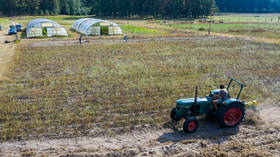REALLY want to help Mother Nature? Don't drive electric cars, ignore paper bags & forget about organic food

The fight against climate change is poised to make a lot of people very, very rich. The world is expected to invest some $90 trillion in new infrastructure to stave off climate doom over the next ten to 15 years, according to a report from the Global Commission on the Economy and Climate, and manufacturers of consumer products want a piece of the action, with study after study revealing customers will pay more for “sustainable” and earth-friendly products. A third of consumers buy based on a brand’s environmental impact, according to Unilever, with a fifth explicitly favoring green messaging.
Not all products sold as sustainable, however, actually are. In fact, some are worse for the environment than the products they've replaced. But there is a reluctance to tear away from the warm fuzzy feeling that comes with doing good for the planet, even when the virtue one is signaling is wholly imaginary.
Kill the bees or kill the trees?
Organic farming – growing food without the use of chemical pesticides and fertilizers – isn't the planet-saver it's promoted as, according to a study published last month in Nature Communications. Farming certain crops organically, including beans, potatoes, and oats, creates more emissions over the entire course of the farm-to-table cycle than farming them conventionally, researchers at Cranfield University found. Trying to get all of Britain eating organic would create an environmental catastrophe, they believe.
Because organic farming yields a smaller harvest per acre than conventional farming, it requires more land to raise the same amount of crops. The report reveals that if just England and Wales were to switch to 100 percent organic farming, nearly five times as much land would have to be cleared for agriculture overseas, with shipping jacking carbon costs into the stratosphere.
It further details that the “total agricultural land-use is therefore 1.5 times greater than the conventional baseline (combining domestic and overseas land).”
There would be some benefits – soil and water health would improve dramatically without the chemical runoff from conventional farming – but lowering emissions would be impossible without a major shift in diet.
This places farmers in the uncomfortable position of having to choose between protecting biodiversity – popular neonicotinoid pesticides have been implicated in the mass death of bees, which are critical to maintaining adequate food supply via pollination – and lowering emissions. A one-size-fits-all approach is unlikely to work. While organic farming represents just 1.4 percent of total world farmland, the industry has mushroomed over the past decade, worth $97 billion annually as of 2017.
The dark side of solar, and other electric fables
Nor is organic food the only “green” product less environmentally sound than its marketing suggests. Renewable energy, hailed as the answer to the world's petrochemical dependency, is not the cure-all it is depicted as. Solar power, for example, creates no carbon emissions once the solar panels are up and running, but their manufacture is a toxic mess. Produced with the carcinogenic, mutagenic heavy metal cadmium and requiring billions of liters of water to manufacture and cool, solar cells have their own dark side seldom examined in discussions of the impending shift to renewable energy.
Electric cars have become a symbol of environmental progress, with companies that produce them receiving government subsidies in many countries. But more energy is consumed in the production of an electric car than a gas-powered vehicle, and a 2011 study found the carbon footprints of both vehicles to be about the same. Electric cars may not produce emissions while driving, but they're only as green as the electricity used to charge them. Worse, the batteries they use are loaded with toxic metals like lithium, copper, and cobalt. Mining these substances devastates the environment, and improper disposal of used batteries can cause them to leak back into nature.
Biomass and biofuels certainly sound environmentally friendly – how can you go wrong with “bio” in the name – but it actually generates more carbon emissions than fossil fuels to create the same amount of energy. Substances burnable under the aegis of “biomass” can include anything from timber waste to garbage, meaning it can burn clean or litter the atmosphere with pollutants. And even burning ‘clean’ wood means cutting down trees – hardly environmentally friendly.
If it comes in a bag, it's not real
Even the choice of paper bags instead of plastic is not as environmentally sound as most people think. With the knee jerk association of plastic = evil, people overlook that paper bags generate more air and water pollution than plastic and actually require more energy to recycle. They take up more space in landfills and require more fuel to ship. Plastic bags are not necessarily better – the Great Pacific Garbage Patch is testament to the damage they can cause – but consumers who believe they're saving the earth by requesting paper bags at the supermarket (and municipalities who think banning plastic is the answer) are sadly misguided. Plastic is in everything, even in supposedly ‘green’ products, according to Philipp Sapozhnikov of the Shirshov Institute of Oceanology.
“Plastic is cheap to manufacture. Its microparticles are in cosmetics, in detergent, in exfoliant scrub, even in the ‘environmentally friendly’ one, too,” he told RT. A proposed EU ban on microplastics in cosmetics earlier this year sent cosmetic brands scurrying to oppose it, hinting that the billions it would cost the industry would be passed on to consumers.
So why are companies rushing to brand things as green that are anything but, and why are consumers letting them get away with it? Included in the (usually hefty) price tag is the sense that the buyer is somehow “making a difference.” The buyer comes away with an inflated sense of their own virtue without having to lift a finger, feeling like part of the solution to a previously insurmountable problem.
“We all have this tendency, if you’re facing a big complicated issue like climate change or saving the rainforest, if you do one thing, like turn out the lights when you leave a room or recycle, it makes you feel like you’re off the hook,” Andrew Revkin, founder of Columbia University’s Initiative on Communication and Sustainability told RT. “I think there’s a big tendency in human nature just to pull back from really big issues, because…they require systems change. We’re not going to solve the climate crisis by turning out the lights” - or by buying green.
“Brands are allowing people to pat themselves on the back without them personally having to sacrifice anything,” Will Fowler, creative director for Headspace, told the Guardian in 2017, describing the bull market in corporate virtue-signaling. And this is the essence of green consumerism – reassuring people used to a high-consumption standard of living that they need not change their lifestyle in order to reduce their carbon footprint.
In reality, consuming less is always better than consuming a “green” product. But there’s no way for companies to monetize non-consumption, and no way to grow a nation’s economy through not spending money. For all the ink wasted in touting “compassionate capitalism,” unrestrained economic growth is not compatible with reducing humanity’s environmental impact. No country can buy its way to zero emissions (though that won’t stop governments from trying with constructs like carbon offsets and cap-and-trade that reek of magical thinking).
It's human nature to want to save the planet, and the corporations driving the green consumer craze are merely taking advantage of this instinct. But the only thing green about their products is the money spent to purchase them.
https://www.rt.com/news/472337-green-economy-fraud-marketing/










